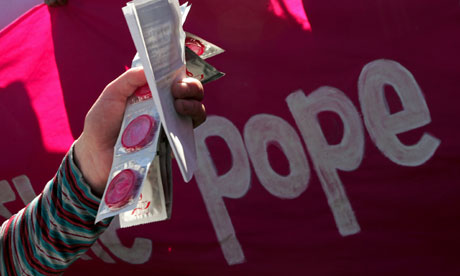No papal decree has been more flouted in the last half century than its repeated insistence that artificial birth control is morally wrong and sinful and none has alienated – or been ignored by – more Roman Catholics.
Many religious organisations have opposed birth control. Muslims and Jews don't like it either, and the Church of England only revised its opinion in the 1930s to enable family planning within marriage.
Originally the opposition was probably about preserving tribal and religious identity: no opportunity to increase numbers should be lost (thus the sin of Onan in Genesis was about wasting sperm). This also makes sense of opposition to homosexuality.
The Roman Catholic Church, however, has found itself wriggling on a particularly dogmatic hook over the last 42 years, stuck with a doctrine that many of its adherents, certainly in western countries, simply ignore. A 2002 US survey found 96% of sexually active Catholic women had used birth control.
A 1966 papal commission on birth control recommended (by 30 votes to 5) that opposition be relaxed. But the then Pope Paul VI took fright and reinforced Vatican opposition in the 1968 encyclical Humanae Vitae, which has remained the church's position ever since.
The church argued that artificial birth control devalued sex's purpose and diminishes responsibility, particularly with men, opening the way to exploitation, abuse and rape.
Officially, as Pius XI ruled in 1930, frustrating the procreative act is "an offence against the law of God and of nature, and those who indulge in such acts are branded with the guilt of a grave sin".
Successive popes have strongly opposed any relaxation of church policy. John Paul II's 1995 Evangelium Vitae ruled against abortion and contraception as slayers of potential children whom God intended to create.
In 2007 Benedict himself inveighed against the "dangerous individualism" of Italian Catholics for not having enough children and, on a flight to Africa last year, he claimed – in defiance of virtually all informed medical opinion – that condom use could actually make the AIDs epidemic worse by increasing sexual activity.
In this, the Vatican has shifted its opinion somewhat by arguing not only that artificial controls are morally wrong, but that the use of condoms is ineffective in preventing infection.
Most notoriously, in a BBC documentary in 2003, the late Colombian cardinal Alfonso Trujillo, who was president of the pontifical council for the family at the time, argued that the AIDs virus could percolate the rubber of condoms.
He also said that, because condoms are not entirely effective in preventing HIV infection – only 90% or so – they are unsafe: "There is that 10% where, due to different causes, a risk remains. "
This position has taken little account either of widespread practice by many Catholics, or of the relevant experience of many women in Third World countries, or of current medical knowledge and experience.
SIC: TG/UK






No comments:
Post a Comment